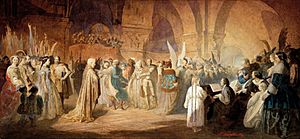Polonaise facts for kids
The polonaise is a Polish dance. It started as a folk dance and then became popular among the Polish nobility. It is in 3/4 time. It follows a distinctive rhythm as illustrated above. Many polonaises are composed in what is called ternary form, or song form, or minuet and trio. These forms all follow an A-B-A pattern. The music of the A sections is similar in both sections, if not exactly identical. The B section is entirely different. It provides contrast in some way to the A sections. In the courts of the aristocracy musicians would often play a polonaise from the gallery while the people danced below in the reception hall.
Polish culture was very popular in Europe in the 1830s and so the polonaise became known in other countries. Composers started to write polonaises for the piano. Pieces called Polonaise had already been composed by Bach, Handel, François Couperin and others, but it was Frédéric Chopin who in the 19th century wrote several Polonaises for piano which became famous. Most of them are very difficult to play, especially the famous Polonaise in A flat, Op. 53.
Several Russian composers wrote polonaises to give a Polish atmosphere, e.g. Tchaikovsky in his ballet The Sleeping Beauty and in his opera Eugene Onegin .
Images for kids
-
Polish Noblemen dancing Polonaise, painting by Jan Piotr Norblin
See also
 In Spanish: Polonesa para niños
In Spanish: Polonesa para niños




